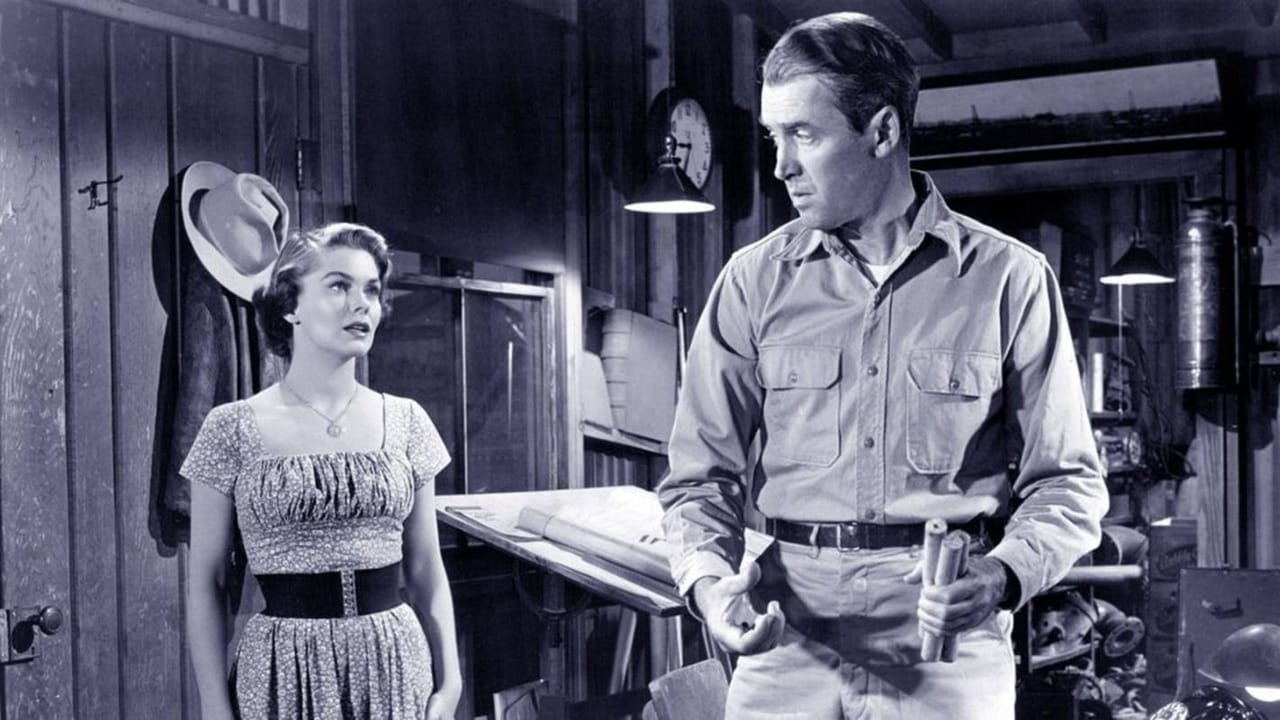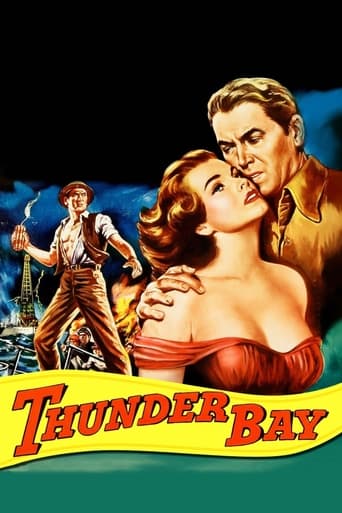



You won't be disappointed!
Good start, but then it gets ruined
This is a small, humorous movie in some ways, but it has a huge heart. What a nice experience.
View MoreThe plot isn't so bad, but the pace of storytelling is too slow which makes people bored. Certain moments are so obvious and unnecessary for the main plot. I would've fast-forwarded those moments if it was an online streaming. The ending looks like implying a sequel, not sure if this movie will get one
View MoreDuring the 1950s, until the two famously fell out over the making of "Night Passage", Anthony Mann was James Stewart's favourite director. Their partnership is best remembered for the five so-called Mann/Stewart westerns, but they also made three non-westerns together, of which this is the second. Thunder Bay is a Canadian city on the shores of Lake Superior, and there is a bay of the same name on the American side of Lake Huron, but the film is not set in either location, or for that matter anywhere in the Great Lakes. Instead it is set much further south in coastal Louisiana. The precise significance of the title is obscure, but it may be a reference to the fact that a storm features in one scene. The action takes place in the year 1946. Steve Martin, an engineer, and his friend Johnny Gambi arrive in the small fishing port of Port Felicity in order to build an offshore oil drilling platform. They are not, however, popular with the local people. The main industry in the area is fishing, especially for shrimp, and the fishermen believe that any exploration for oil will put their livelihood at risk. (The word "shrimp" in American usage obviously denotes something far larger than it would in Britain. We would call what the fisherman catch "prawns" or "scampi"; "shrimp" refers to a similar, but much smaller, species of crustacean. Hence the expression "little shrimp" to mean a small person). An added complication is the romance which grows up between Steve and Stella, the beautiful and intelligent daughter of one of the fishermen. Stella is better-educated than most of her fellow townspeople, and is one of the few with experience of the outside world, having worked in Chicago. She is, however, also one of the fiercest opponents of the oil drilling project, having been left with a deep distrust of the business community and of outsiders in general by an unhappy love-affair with a city-slicker type in Chicago. One reviewer describes the conflict in this movie as "almost Marxian", but this strikes me as overstated. Marxists have normally seen the class struggle in terms of employer/employee relationships, something largely absent from this film. What we see here is the clash of big business against small business, Big Oil versus Little Shrimp. Rather surprisingly, at least from a modern perspective, the film generally takes the side of Big Oil. The shrimpers (with the exception of one who resorts to violence) are not exactly cast as the villains of the piece, but they are shown as Luddites, standing in the way of America's inevitable progress towards a golden industrial future. Steve, Johnny and their financial backer Kermit MacDonald are the good guys because they are on the side of that future. The only bad guys on the big business side are the faint-hearts in the company who threaten to cut off funding when Steve seems to be making slow progress in finding oil. The special effects during the storm scene probably did look special in the early fifties, but today, in comparison with something like "The Perfect Storm", they are nothing much. What really dates the film, however, is its complacent assumption that it is in the public interest for big business to get whatever big business wants. Any environmental objections to its plans can simply be brushed aside or made to disappear as if by magic, as happens here. Rather improbably, Steve and Johnny not only strike oil but also discover a rich new source of shrimp, which ensures lasting wealth and prosperity for Port Felicity and removes any obstacle to the love of Steve and Stella. The Mann/Stewart westerns include some excellent films such as "The Man from Laramie" and "The Naked Spur", which brought to the genre a new emphasis on the importance of character and a greater moral complexity than the old "white hats versus black hats" formula. Their non-western collaborations, however, are not always up to the same standard. I have never seen "The Glenn Miller Story", but "Strategic Air Command" is overlong and dull, and "Thunder Bay" is not a lot better, although it is at least shorter. This is not Stewart's best performance- at times he just seems to be going through the motions- and Dan Duryea seems a bit too abrasive as Johnny. There is not the same emphasis on well-developed characters as in the Mann/ Stewart westerns and the plot is really just a romantic comedy set against the background of the oil industry, although without very much humour. Any tension or conflict is allowed to evaporate by that magic ending. "Thunder Bay" looks very dated today, and not only by the fact that the scriptwriter used the name "Kermit" for a character who wasn't a talking frog. (Although in 1953 the Muppets only lay two years in the future). 5/10
View MoreThis was decent entertainment but nothing special, which it could have been with the likes of James Stewart, Joanne Dru, Dan Duryea and Gilbert Roland, and directed by Anthony Mann. This is supposed to be very good widescreen viewing but, unfortunately, I haven't viewed it on that format. We are all stuck with a formatted-to-TV tape until a DVD is released on this film. What's the holdup?Duryea and Stewart played their normal interesting roles. This is mainly storytelling, even though it's listed as an "action movie." Nobody gets killed, and there is very little violence and, of course, no profanity. It's simply a story of some people who are the first to successfully drill oil offshore and the resistance they get from the local fishermen.Dru mostly frowns through the picture, so she's not that likable as the female romantic lead. Stewart's squeaky voice doesn't across that well here, either. He sounded better on most of his other films. It's an okay movie but certainly not one I would watch frequently, but I would like to see this in its intended widescreen version.
View MoreThe outsiders are the oil guys coming into a small fishing town off the Gulf of Mexico. Jealousies erupt, fear of the new technology is involved. Businessmen are risking everything they've got "and this time it has to work or they're finished". You know the rest.You should decide for yourself whether it's the acting or the script that's marginal. Stewart plays it like he always does, but there's not much challenge in the role. I can't help but wonder if Senator Kerr (D - Okalahoma) helped finance this little "promo" piece for his company.Interesting though that this really is a look at Kerr-McGee's first offshore oil platform, which struck oil at a time when the post-war (we can make cars again!!) economy was exploding. The shrimpers are still shrimping and the oil is still flowing from that day to this (with a little break for a few hurricanes).An informally educational look back at the hot controversy that abounded at the time, 1947.
View MoreWatching this thing again after so many years I was impressed by those of its qualities which never seemed to have survived the 1950s. A loud brassy theme assaults us, announcing that this is an important (not to say major) motion picture. Huge credits in relentlessly white letters with serrated edges, alphabetical lightning bolts, splash across the screen. And the credits are all over with in a minute or two.What follows is the story of -- nope, not Thunder Bay, Michigan, where James Stewart was to shoot a later film, but a small town in Louisiana. Stewart and Duryea manage to finagle some financing in an attempt to realize Stewart's dream of building the first offshore oil rig. It has to be a dream, an obsession, like Tucker and his car, because the alternative isn't very flattering to Stewart. "Why are you doing this?" asks Joanne Dru, "Will it make you rich?" Stewart: "Not especially." We can permit ourselves a bit of a chuckle at this point, I think. The oil industry is fulfilling its dream and all that. But Stewart tries to explain to Dru why he is so driven. Really he does! And it comes out something like, "Mebbe you don't know how oil is made. You see, there were these dinosaurs...." And he winds up telling her that he's trying to capture a little bit of time, of prehistory, and that money couldn't mean less to him. "What's money, after all? Just a piece of paper crawling with germs." No -- wait. That's a different movie. At any rate, you get the idea.The whole movie is equally simple minded and equally enjoyable in its politically incorrect recklessness. The Cajun fishermen of the village (all of whom are of Hispanic origin, but what the hell) are hostile to Stewart, Dan Duryea, and the other oil men. There are two Romeo-and-Juliet sorts of romances. Dynamite explosions. A fist fight to the death on a swaying oil rig in the middle of a hurricane.A lot of people find Stewart unfailingly engaging and I agree that he's a fine actor. Dan Duryea is his libidinous sidekick and supplies most of the wisecracks. He's not an actor with any range. (Imagine him as a respectable shrink.) And he looks slimy, like an evil Bob Fosse, and his voice is piping and always vaguely sinister, but I always enjoy him anyway. Gilbert Roland plays Gilbert Roland, the hairy chested man of action and gallantry who laughs off danger. At one point in the movie he tries to project major guilt and break into a sob, which is a mistake. The rest of the cast provides us with a lot of familiar faces.It seems that Anthony Mann never directed Jimmy Stewart without turning him into a neurotic, and his obsession here alienates everyone around him. But, not to worry. It all ends happily. The men get their oil, the villagers get their golden shrimp, and Stewart and Duryea get their girls. This is the 1950s. It ought to be in a time capsule.
View More